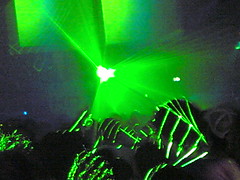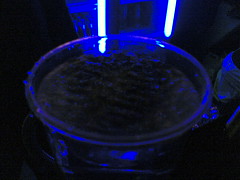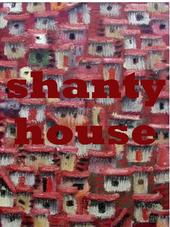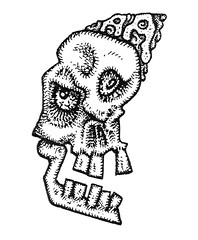
Blackdown: For those who don’t know your history, can you explain a little about how Skull Disco the label and the parties came about?
Shackleton: Well, I was making tunes on the computer at pretty much any bpm. Some just noise and experimental style, others ongy-bongy style and I gave a CDr to Ian Hicks of Mordant music. He really liked a tune called Stalker and he decided to put it out on Mordant Music. Anyway, that got picked up on by Rough Trade and they decided to put it on their Best of 2004 CD. I was really amazed that someone liked it, but it gave me confidence to start my own label. Around the same time we'd started going down to FWD. To be honest, I didn't like everything that was being played there, but I really liked some of what Hatcha and Youngsta were playing, especially the more interesting percussive stuff. I suppose that I just started keeping some of my stuff within the 140-147bpm range at that point. So anyway, I thought about starting a label and I had the confidence from the Rough Trade thing and seeing that people were making interesting bass music. I mean I remember when Horror Show and Conference dropped and thought that that was the stuff I was aiming to do.
Anyway, so I had loads of tunes on that sort of tip, but not as accomplished to be honest, and wanted to put them out. Now my idea of a party is one where people let themselves go and are bang into the music, and I was reading this book at the time about a tribe from Cameroon who dug up their ancestors remains so as they could enjoy watching the festivities while the living members of the tribe played music, danced and got pissed. I thought 'that's the spirit!' So I decided to call the label Skull Disco.
Anyhow, I went over to Bath one night where Laurie Appleblim was putting on a night (I think, but my memory's a bit frazzled these days). After the night we went back to his place and he played this tune he'd made, “Mystikal Warrior.” It sounded great, so I decided to put it out as a double A-side with my own tune, “I Am Animal.” Going back to the book I'd been reading, I knew a bloke from my home town who used to do brilliant cartoons and who I'd used when I was doing a punk fanzine back in... well, a long time ago! I told him the idea of skeletons dancing, making music and pulling their ancestors out of the ground and he came up with the amazing sleeve for Skull 01.
As for the parties, I knew that no-one was going to come and book me so I decided to do it myself. I knew someone who ran a semi-legal venue nearby and I knew this squatter guy who had a massive bass rig for reasonable rent. It all came together nicely. It was great actually, but the local police got wind of things, actually I think they just had a general clamp-down (probably someone hadn't been paid somewhere along the line, it's Stoke Newington you see - notorious for dodgy coppers) and I couldn't carry on. So, I went looking for a new venue, knowing I was on a hiding to nothing, found the Red Star in Camberwell, nearly bankrupted myself and thought 'balls to this game.' They were/are good parties though. Especially the first one. Apologies if this isn't totally chronological. My memory is pretty ropey.
B: What was the name of the artist who you found for your sleeve work?
His name's Zeke Clough. He's an old friend from my home town. I knew he was great because he did a bit of art for a fanzine I used to do, but the sleeves are even better than I could have expected. I give him a basic idea and he takes it well beyond what I could have imagined. He's a lovely bloke as well. He's not into self-promotion at all, but I think he get his stuff on display somewhere.
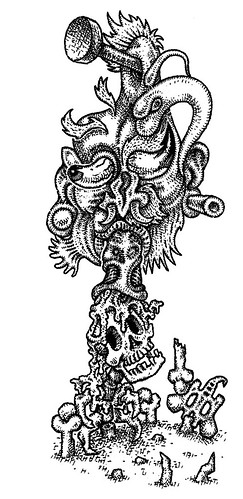
B: During the early days of the Mystikz, 2004/5 I guess, I can just remember you, Engine Room, Appleblim and George Infinite just going for it at the front of FWD>> and DMZ, like you were the original official skankers. What do you remember of those times?
S: Remember? I was out of it a lot of the time! Ha! Only joking (well, half joking). They were really exciting times. You see, the only reason you remember that is because, at that time, it wasn't really a lively crowd. It was a strange mix of people and I think there were a lot of self-consciousness on the dancefloor. I remember though once reading an article of yours when you were saying something to the effect that urban crowds aren't as likely to shake a leg. Is that right? For our lot, we didn't really care what people thought, but none of our lot are originally from London, so maybe that's why, but, to be honest, I'm not sure that's really the reason why. I mean, you've got to think that we'd come into this place with an amazing sound and were getting belters like “Horror Show,” “What?,” “Conference,” “Roll That Shit!” and others dropping on us. I mean, if we were going to be shocking out to anything, it'd be that stuff.
You know what though? We loved that Mystiks stuff so much. I reckon all of us, Engine Room, Necta Selecta, Appleblim, and myself just felt really at home with what they were doing (are still doing). We'd go to places like Bath and Bristol to see them, just because it was going to be great music and a good laugh, even if there was next to no-one there. That said, I remember that Subloaded one in Bristol. It was packed and heavy as anything I'd been to in London. Great stuff!
B: After you’d decided to put music out together, how did things work between you and Appleblim?
S: Things have pretty much fallen into place easily. Appleblim's a good friend and we get on well. Basically, I've financed the label and nights while Appleblim's done the promotional stuff. It's just come about naturally as he's very good at talking to people and has a broader knowledge of 'the industry' and actually enjoys that side of things whereas I just don't have the enthusiasm for it. You know, we never actually allocated each other roles or anything, it's been an organic thing.
B: Can you tell me why you've decided to end the Skull Disco nights and label?
S: There are lots of reasons for this. The nights because they lose a lot of money, involve a lot of work and are pretty much a thankless task! I was putting them on at a venue in Stoke Newington which was ideal, but then it had to stop due to police interference, after that it was always going to be an uphill struggle.
As for the label, there are reasons that I don't want to go into. That said I'm not ruling anything out. If I'm not happy with entering into a contract with somebody, then it's a possibility that I could still do Skull Disco, but I just hope that people won't be annoyed if I don't make 140bpm bangers all the time.
I don't know, I've had a really strange year. A lot of it has been horrible to be honest. I just feel like starting again. I had time this summer when I was away to think about what I wanted to do and I just thought that I wanted to get on top of my beats. I spend ages on the drum programming and chopping up, so I really need the time for that. I'm not a natural music maker. I love it, but I can't bang out tunes like that, also I'm in my early thirties and just take more time to work things out than I used to, that and the fact that I've spent a time destroying my brain cells one way or another. If a label backs me then I'll work on the beats like a beast! I'll probably still go ahead with Imminent Apocalypse though.
B: Could you also explain when and how you started to produce?
I've always been into making music, be it with a four-track when I was in my teens, or messing around on the computer like these days, but I started to make the stuff you're more familiar with when my 'dancehall' combo, Evil MAstermind' broke up due to my partner in musical crime, MC Great Emancipator, now known as Tenfold Vengeance, decided to go the other side of the world and convert to Islam. We were using a Zoom drum machine with this weird wobbly bass effect. After he went I didn't really want to do a one-man Karaoke act, so I decided to get a computer.

B: What originally attracted you to dubstep?
What really attracted me to dubstep was that at that time it wasn't a known genre and it was just creative people making interesting and idiosyncratic bass music and that going to Forward was an event where I could get trashed with my friends and enjoy proper music rather than listen to some formulaic toss in a rip-off club with a poxy sound system surrounded by hooligans and over-eager bouncers.
To be honest, I'm not a big fan of all dubstep, just like any genre it's got music I like and music I'm not as into. I said that hearing “Conference” and “Horror Show” amongst other things really made me appreciate certain producers, but I feel dishonest claiming a place on the dubstep train.
But it's probably fair to say that sub-consciously I started to narrow my parameters a bit so that DJs might play my tunes, I mean it needs to be able to fit within the pitch range of DJs and I really couldn't see anyone else playing my stuff outside of the dubstep guys, but, to be honest, I'm not as reliant on that as I used to be. I mean no-one played my stuff anyway!
Nevertheless, I think it still holds true that there are people making really creative stuff within the genre. I'm thinking especially of Mala, Loefah, Kode 9, Burial and probably others that I'm just not so familiar with at the moment, but I just think that the vitality is kept up by the diversity. So, in a sense, the strength of the genre is the fluidity of it too, which almost defeats the point of having a genre in the first place! Christ, I don't know. I just like music and want to make music that other people can like. Call it dubstep if you like.
B: You say the “vitality [of dubstep] is kept up by the diversity” and it concerns me that dubstep might be narrowing in its diversity as people rush “to be dubstep” and imitate rather than find their own style. I’ve always respected you and Appleblim for going your own way, stylistically and musically – is this a conscious decision or does it come naturally? Was it important to be independent or were the links you built with the scene important too?
S: This is going to be a lengthy answer with a lot of tangents, but I think that there's no way to be simplistic about this. First off, I can't speak for Appleblim, he's his own person and we've never discussed the music in terms of its style or meaning. I would say that for both of us that we're both old enough to have heard a lot of music and have both been involved in making lots of different kinds of music, so there's going to be a broad range of influences. Right then, here goes the next part and it's strictly my opinion and not Appleblim's.
People rushing "to be dubstep". What does it mean? I mean if you have an idea then you can communicate that idea regardless of the genre. Some people are saying now that drum and bass is no good and dubstep is great. For me that's ridiculous. Bass heavy music with a broken beat running at 160-180 bpm is no good, but bass heavy music running at 140 bpm is great. I mean it's really stupid and annoying. I like good music. The only reason I've been running at the bpm I have is because someone might be able to beatmatch it. Is that dubstep? In terms of the atmosphere and sounds that I want to create I'm using the likes of Metal Box era PIL and Savage Republic as my benchmark if anyone.
So you ask if I made a conscious decision to go my own way. I never thought about it. I just made the tunes that I wanted to hear. Now, when I first went to FWD>> I'm not going to pretend I was blown away. I liked some stuff and wasn't as keen on other stuff. I remember really liking the Hatcha sets, but thinking it's not quite what I want to do myself. And I remember just being mildly disappointed that the sounds that I liked weren't being assembled in the way I'd have liked them. Then stuff like “Horrow Show” dropped and I was blown away. I didn't think though "oh let's be into dubstep then", I thought "here's this fucking tune with a massive personality smashing you in the guts, that's proper music". Well, I probably didn't say that at all as I was probably off my head and jumping on top of the speaker or something! In fact it's all a bit simplified to make easier reading and to illustrate the point.
But anyway, the point I'm making is that the tune has got a massive personality and stands alone. As do loads of tunes. I won't bore you with a list, but it's pretty much the DMZ axis for me. They're good because they're good, not because they run at 140bpm or whatever.
As for links to the scene and their importance. It's a double-edged sword. There's no doubt that I wouldn't be selling the amount of stuff I do if dubstep hadn't broke through the way it did after Mary Anne Hobbes' show in January. Likewise, people like Loefah and Mala Mystik have always been really supportive of what we've done. They showed up to the first Skull Disco night and that meant a lot to us. By the same token, I seem to get interest and sales from people outside of the dubstep thing and played by DJs from different genres. So I feel like a bit of an outsider to 'the scene'. It's a double-edged sword then because I really respect the quality producers and I love the fact that there's little of the overtly commercial vibe, but that I feel uncomfortable with the dubstep tag. Although I totally recognise that without 'the scene' Skull Disco wouldn't have got any exposure, or, in fact, wouldn't even exist.
You say it concerns you that dubstep may be narrowing its diversity as people rush to "be dubstep" and imitate rather than find their own style. It should concern you! But that's not something that can be applied to just dubstep, that applies to anything. What's the point in trying to do someone else's thing? I did enough of that when I was at school. It's balls.
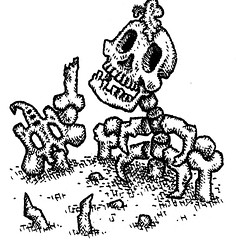
B: One of your early track contains the vocal sample “when I see the towers fall…” I’m guessing this isn’t a Tolkien reference, instead a Twin Towers reference. Can you elaborate about this lyric?
S: Right, I'm crediting you with enough intelligence that I don't need to start with meaningless platitudes so as not to offend your sensibilities. The same applies to your readers.
I make music. That music is an expression of some part of me. As has been said before and you can rephrase it to be appropriate "do you think guitars and microphones are just fucking toys?" I'm into what I do, I mean it, and I'm not going to censor myself to make things easier for myself or other people. Music is in the sacred realm. I can't do something I don't like or don't want to do in the music. I have to do enough of that in the everyday. So, it goes that if I've got a lyric like that and it fits with the track, I'm going to use it.
This is going to be another lengthy one I'm afraid. First of all, yes, it is a reference to the World Trade buildings. So, I'll briefly describe my feelings about the event itself, then place it in context of the track.
I remember seeing it on TV at the time. I don't think I appreciated the full immensity as to what had happened. My immediate reaction was, "oh balls, here's a great excuse for another military adventure in an Arab country and kill loads of innocent people". Well, over the next couple of days I started to realise its significance. I even borrowed a television to watch the coverage (I gave it back though after I started watching Neighbours again after a 14 year break). Anyway, so I thought that it was like a story from the bible. That's how I think it will be thought of in time. Here's these buildings and all they represent seemingly indestructible, then all of a sudden they're nothing more than dust. All that's solid melts to air if you will. So that's the general idea I was trying to communicate. The lyrics are:
“When I see the towers fall,
It cannot be denied that,
As a spectacle,
It is a realisation of the mind.
You see, I'm standing on a mountain top
And letting out a scream,
It's the language of the earth,
It is the language of the beasts.
There's no point to look behind us,
We left the corpse behind,
Because flesh is weak and forms break down.
They cannot last forever."
-- “Blood on my Hands” by Shackleton
Then the sample is from a reading of Paradise Lost. "The mind and spirit remain invincible." Does this make sense now? I can't really break it down more. I'm really proud of the lyric and if I pull it apart it loses its meaning.
B: You also have a track name called “Hamas Rule.” Are you never concerned about addressing political issues in track names? (The word “rule” for example could be interpreted in two ways, “they rule!” and “are ruling”).
S: Yes, I think that can be taken both ways. When I made the track I was listening to Radio 4 and the news was about Hamas winning the election in Palestine. The sample I used was Lebanese (I think, you see the CD I've got has a strange mix up with the track listing). Anyway, when I finished the tune later I think that Israeli forces were in Lebanon. I think the idea was that Palestinian resistance were using Lebanon as a base. This had all gone on within a few weeks and seemed to be running in synchronicity with the tune. So the name stuck. I probably should have called it Hizbullah Rule, but it's not true in reality, so then that would have meant that "they rule!", which is not what I wanted to say! To be honest, I did think about changing the name of the track because of that possibility of misinterpretation, but, in the end I felt the title fitted well and would have felt like I was censoring myself. Essentially, it's an instrumental piece and as such is pretty abstract.
I'm not saying that I won't ever do but I'm not really into addressing political issues too much, especially one's like the complicated politics of the Middle-East, in fact, I'd prefer not to, I'm not well-enough informed. Obviously though, these are pretty desperate times for many people in the world and I have sympathy for anyone suffering. Being realistic though, no-one's going to smash the state because they heard a Shackleton tune, they might smash the record though!
B: Re "Hamas Rule", its interesting that the name came about because of the backdrop of political events at the time, but when new listeners encounter this track they might see it not as a reflection of what you were being presented with on the news, but as what you're presenting to them, i.e. the intent of meaning comes from you. What I'm trying to clarify is what your intent is by invoking powerful political issues in your title? To reflect? To make a statement? Because I worry when I write track names, that being ambiguous with such a heated issue might leave me open to critism or open me up to a debate I'm not trying to get into. Don’t these issues concern you?
Yes, they do concern me and with hindsight I probably wouldn't have called it “Hamas Rule.” I know this sounds naive, but I didn't think about people who don't have English as a first language taking it to mean "they rule OK", which is not what I intended but something I've seen on a website.
Just to turn it around a moment though, if I had a tune called “Tory Rule,” would people be thinking I meant I like Maggie Thatcher? It is a heated issue though, you're right, and, even though I'm not into sanitising something to make it more comfortable, I probably shouldn't be allowing myself to get dragged into a debate I don't want to be in. As I said, I would have felt like a coward censoring myself and hoped that people would take the adjective - noun version, rather than the noun - verb version.
I tell you what does concern me now I come to think of it. The fact that it might be construed as cheap. I wouldn't want someone to think that I'd rip something off for a bit of controversy so I could sell a few records, or that I'd try to associate myself with something I'm not a part of because it gives me credibility. I'll just turn the thing on it's head again though as I seem to be making a habit of doing. How many tunes use lyric samples of violent imagery or that reinforce negative racial stereotyping? I mean fucking Scarface must have been used to death by now. Or think about how The Krays are always spoken of fondly these days. If you were getting tied up with barbed wire and whipped by them you wouldn't think they were lovable rogues. It seems to me that there is an admiration of violence and machismo that is accepted by, at best, or, at worst, supported by some sections of modern society. Why is that not controversial?
Now, I totally understand what you're talking about and I does worry me a little bit that people would think I'm supporting Hamas, but, by the same token, it's an instrumental piece. If I had a sample in there that said "let's drive the Jews into the sea", then I'd say that I've put myself on dodgy ground, but that's not something I believe anyway. As it goes, I do hope for a better life for the Palestinian people, but I also hope that a solution can be found so that Israel can live in peace with its neighbours. I'm not an authority on the situation though and so I concede that, with hindsight, I probably should have chosen a less ambiguous title.

B: Can you tell me about your Japanese trip recently? What did you feel/learn/like/dislike about Japanese culture?
S: My wife's Japanese and so I had the opportunity to experience Japan from the inside. I mean we stayed with her parents and then some of her friends who had children of their own, so it was not a tourist's view of Japan. It was really interesting. I felt totally safe wherever I went and really enjoyed it. I found Japanese people to be very considerate and sensitive to other people's feelings. That was a beautiful thing.
[On one occasion] I went to a coffee shop/drinking den under a subway where everyone was gambling. I realised pretty quickly that I was in the equivalent of The Blind Beggar or something, surrounded by, at best, the local rough boys, at worst, a load of Yakuza. Anyway, I thought I'd just sit it out as I was curious and also I didn't want to look a prick walking out!
So I ordered an iced-coffee and sat down. That was my first mistake. I'd sat in the big boy's chair. Anyway, the waiter relocated me. No big deal. Then, mistaking the clear syrup in the jug for water, I filled my class with sugar syrup. As I was about to drink it. A bloke with a speech impediment started to try to speak to me. Naturally, I told him cheers, clinked his glass and took a big mouthful. Of course, everyone saw me making a complete dick of myself. I was so surprised by drinking 12 tablespoons worth of sugar that I knocked over my full glass of coffee over. As in right over the table and all over the racing page of one of the old boys!
You know what? Nobody said a word. In fact, the waiter brought me a new coffee and everybody pretended not to notice. Well, all I'm saying is that you can draw your own conclusions as to how that would contrast with the equivalent place in Britain. And maybe that's the point. There is no equivalent. I never once felt I had a grip on it and how it worked. It was brilliant. Really brilliant. I never once got bored. But I really did feel like a voyeur in someone else's show!
B: You have an original percussive style, both in timbre and arrangements. How did this come about?
S: Hard work. I love it, but it's really hard to chop-up and program the beats and then get them to flow so they sound organic. I'm reasonably pleased with the results so far. Bass is important, but, for me, there has to be more going on than just that. There's a guy called Chronomad that has got it going on like I want it, but I think he's actually playing the percussion and looping in. Mostly I'll get individual hits of a drum, then I'll feed them into different inputs, knock the tone off on some, add reverb on another, time-stretch another etc, so that I'm left with a range of different sounds that a single drum could produce. Then I normally loop a bassline and follow the bassline with the drum until I'm happy with the progress of that particular drum, then I'll do the same with some other percussion.
Now during the course of that, the impact of additional sounds will affect the initial dynamics, so that I'll have to go back and alter that, which in turn impacts on the rest. It's a long and laborious process and I can never remember what the tune sounds like because I'm not listening to it, I'm so caught up in looking at the tree that I can't see the forest!
So then I sit back and listen to the whole tune and start again. I know when the tune's finished when I can follow it all the way through and the progression of it doesn't jar with me instinctively. I know when the tune's good when I can go under the influence of it and it starts to give me a physical reaction or I end up looking at the speaker quizzically! I'm sure it's the same for all kinds of music. I see it as getting to grips with a language. You learn one aspect of the grammar, then you have to undo all that when you learn the next aspect. I'm still at the level of a toddler though, but I want to get better at it. Or do you mean for what reason do I make it as opposed to the nuts and bolts of it? There's never been a conscious thing to make it. I just like what I do, it rocks my boat.
B: You said you're working with a percussionist, can you tell me more about this?
I saw him by chance with a band at a festival in Wood Green. He was wicked and I asked him if he'd like to do a bit of something with me. At the time I was trying to pitch some tunes for a documentary. I won't elaborate because I'll be really disappointed if they don't get used. Anyway, we started working together and it was great, but I realised that the two media don't quite work together, at least not for me, so I still ended up chopping the stuff and dubbing it!
We'll work together in the future, I'm sure, but it needs to be a different project. Probably be looser, more ambient, and prose type vocals. The apocalyptic theme will be in there too, along with some interviews with old people about the weather they remember as children.
[The percussionist is] South African and I saw him in a band with an oud player and a flute player. They were making some kind of decent racket. Actually, it was him that I really liked. He would go off on these really intricate tangents. The music had a very strong middle-eastern influence, but he actually plays a West African drum called an udu (the specific type is called an atilogu). You see, I've always liked the high end percussion to be doing all the movement in the tune, but it's really hard to get that falling-out-of-time-to-the-point-of-almost-collapse type of thing going with a machine, so I'd been thinking about it for a while. It's great though. It didn't work out exactly how I expected, it's needed chopping a lot, but at the minimum I've got a decent sample bank and it's given me good ideas.
We filled his drum full of water so that we could cut down on the resonance, after that, I put it through a filter. I'm a bit of a Luddite with sound theory, but I worked out how to get the sound I wanted eventually! He's been in a few bands, he's even made a living from drumming a one time. One of his bands is called Stark Raving Sane. I'm not so into that, but his playing really shines through. He's a lovely bloke.
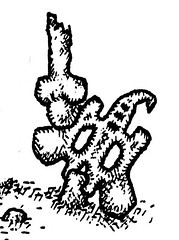
B: Do you have any album plans?
S: At the moment I'm not signing anything and am just weighing up what's the best thing to do. I really appreciate the faith people are showing in the music, but it's a very precious thing to me and I want to make sure it's the right thing to do.
B: A lot of dubstep fans are also micro house fans and your tracks seem to have attracted interest from Villalobos amongst others. Are you a fan of or inspired by micro house? What do you think of any overlap between micro house and dubstep?
S: I don't know the first thing about it and I'd never heard of Ricardo Villalobos! I've got a couple of CDs since and think they're wicked, but I don't really have a great understanding of different musical genres, especially not electronic music, so it's hard for me to comment. I just like the beats I like. That's why I'm not keen to say all dubstep is good and all other genres of music aren't. If someone's got interesting tunes, then I'll give it a go.
It's a funny thing, because since I heard the Villalobos stuff, I realised I've got some things that he might like, but I think I must have got there by a completely different path.
B: You’ve mentioned they’re thinking about booking you to play house clubs, is this still the case and how do you think they’ll respond to your sound?
S: Martin, you said the magic word, "booking!" It's a word I haven't heard too often! How does anyone respond? I'm not re-inventing the wheel. I've played at a friend's 40th birthday party where everyone went mental, all the old punks and that, then I've played at dubstep dances and got little reaction. I'm not a snob about who'll like it or not. I reckon that I'll bomb completely at some places and get a good reaction at others. As I say though, I haven't signed anything yet, so I'm not counting my chickens.
B: You mention you’re originally from a small mill town in Lancashire. How important an influence on your music is where you’re from, compared to places you’ve since found yourself in or ideas you’ve subsequently (to your upbringing) exposed yourself to?
S: Well, I know a lot of pub jukebox classics like “Rhinestone Cowboy” and “Tell Laura I love Her!” I don't know whether that's been a big influence though. But where you come from is going to influence your outlook and, in some way, music is related to that. I mean, it's funny, but when I was an 18-20 year old in my home town I thought that Kraftwerk's “Man Machine” album was the best record ever. How does that tie in with where I come from?
Outside of the tedium of everyday life that is where I come from though, there's great countryside if you walk a while, really dramatic and not-at-all picture postcard. Maybe that's influenced what I make too.
Some things that I was never exposed to though were proper jungle and dancehall. Well, basically, music with Jamaican influences. I mean, I've always been a big fan of the classic dub producers, like King Tubby, but outside that, nothing. So, being here has been great. That said, I've lived in a few different countries too, including Turkey and Hungary, so, as a friend of mine used to say "it's all flavours to the musical pie."
For a taste of the Shackleton sound download DubSTa’s mix.

